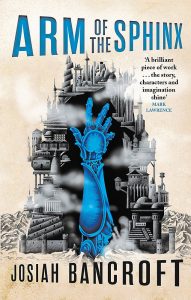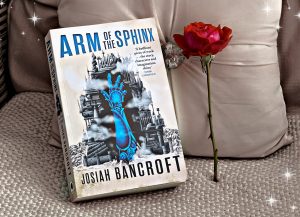ARM OF THE SPHINX by Josiah Bancroft (BOOK REVIEW)
“There was no honest work for a small crew on such a lowly vessel. Every port they approached shooed them off like a fly from a table. They turned to piracy to keep from starving. Senlin sipped his rum and squinted at the memory. “We have gotten quite good at running away,” he said.
“We’ve gotten very good at having to,” Edith corrected.”
 From the very first page of this sequel to Senlin Ascends, life once again takes some drastic turns for our main protagonist, Thomas Senlin. Once a man of letters, then progressing to a man of action, he must now live a life piracy. The hunt for Senlin’s wife, Marya, becomes more complex and as Senlin and his crew struggle to survive upon their stolen airship, he realises he’s going to need help, a lot of help. In their desperation they decide to seek out the infamous Sphinx. Many believe the Sphinx is a myth, a figure to scare children into behaving, a legend whose stories have spread far, the man said to be behind many of the Tower’s bizarre mechanical creations. Yet Senlin is willing to do anything to find a safe way into the next ringdom, even if that means finding the Sphinx and owing him a great debt.
From the very first page of this sequel to Senlin Ascends, life once again takes some drastic turns for our main protagonist, Thomas Senlin. Once a man of letters, then progressing to a man of action, he must now live a life piracy. The hunt for Senlin’s wife, Marya, becomes more complex and as Senlin and his crew struggle to survive upon their stolen airship, he realises he’s going to need help, a lot of help. In their desperation they decide to seek out the infamous Sphinx. Many believe the Sphinx is a myth, a figure to scare children into behaving, a legend whose stories have spread far, the man said to be behind many of the Tower’s bizarre mechanical creations. Yet Senlin is willing to do anything to find a safe way into the next ringdom, even if that means finding the Sphinx and owing him a great debt.
Bancroft’s prose is once again exquisite, he shows a real flair for writing poetic descriptions filled with much vivid imagery. The Tower itself is as surreal and whimsical as ever, with more strange clockwork mechanisms and bizarre animals, magnificent balloon airships which dominate the sky, yet this time we even encounter some fantastical characters too. The ongoing adventure through the Tower of Babel becomes even more treacherous than in the first book. Very early on Senlin and his crew face a battle, having to steal and bargain for information and eventually with very little choices available to them, they enter wild and dangerous territories, and find equally dangerous people along the way. There is much darkness and humour to the prose; in this instalment, many of the characters became sassy and good naturedly bantered or quibbled with one another, even when events took perilous turns. Quick-witted humour is something that I immensely enjoy, therefore I was kept thoroughly entertained.
‘I have eaten the chocolate. To the future me that reads this: I am sorry. It was delicious.
And entirely deserved.’
Besides humour, another aspect I always love to see in books is close knitted friendships; ones that are endearing, melt your heart, and make you truly care for the fate of all the characters. Bancroft certainly ticked all the boxes here, because Thomas Senlin and his crew were all so loveable. Edith remained her fiery self, yet we see a vulnerable side too, sturdy Iren develops a truly heartfelt bond with our young Voleta, and Adam does all he can to earn back Senlin’s trust. In this book we get multiple points of view, which was a welcome inclusion, as it perfectly brought some needed limelight to the charming side characters from the first book, and of course to some new ones too – Byron and the Sphinx. These two were both so unique, not only because they were part mechanical (Byron was actually more of a metallic animal), but they also delivered much of the sassy banter which I mentioned earlier.
However, Senlin’s character still remained at the forefront of the narrative. I was pleased to see his naivety lessen, his actions become bolder, and his sense of loyalty to his friends deepen. This growth in character didn’t completely change him though; as captain of the Stone Cloud airship, Senlin still made mistakes, he was still flawed, insecure, overwhelmed, he didn’t suddenly turn into some valiant hero. Senlin lies to his friends, he holds secrets close to his chest and is reluctant to reveal his weaknesses. Once again though, he eventually learns from his mistakes and makes some difficult choices. Frankly, Thomas Senlin remained human, and that is why I am so drawn to his character.
“Senlin woke feeling like the tea bag at the bottom of an empty pot: wet, heavy, and used up.
The forest shone on him lying on his back in the sand. He had the strange inclination to gather up a pile of the glowing branches to build an absurd campfire, one that glowed blue rather than orange and cooled rather than warmed. He and Edith could sit about it and sing songs and roast ice cubes.”
Lastly, I believe the Tower of Babel itself is a significant character. Each ringdom holds its own personality; it’s own quirks and style. The Silk Gardens has to be one of my most favourite ringdoms we have visited so far. From the moment Senlin’s airship lands upon the ruins of a great battle, to the point where he and Edith are attacked by giant spiders, stumble upon a peculiar type of zoo, and are surrounded by an abundance of hods, I loved the eerie atmosphere. Yet Bancroft also uses the absurdity found within the Tower to reflect upon the flaws of societies. Different parts of the Tower heavily contrast between technological advancement and luxury, to more rudimentary ways of life for those who live in poverty. Although this setting remains unique and something that I’ve never come across before, it also holds a great exploration of relative issues such as class and privilege.
I know that the ending of Arm of the Sphinx divided many readers, fear not I won’t discuss any spoilers here, but in my opinion I liked the direction the narrative took. Bancroft is an author who takes risks, who plants his very human characters in surreal settings and explores how that in turn shapes them. Therefore I’m very much looking forward to seeing how their story arcs will develop in The Hod King.
“I must forgive myself. I must beg the pardon that I owe. And I must decide to make my life more than a tribute to past failures.”

